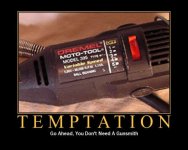Here's an old post I did on being a gunsmith:
Here's the hard, cold facts about gunsmithing.
If you're planning on being in the business as a pro, you're not going to get there with a correspondence or some kind of online course.
Businesses that hire gunsmiths want people who they KNOW have learned the job and can do the work.
That means a diploma from a good attendance school like Colorado School of Trades, Trinidad College, Lassen College, or one of the others.
Show up looking for a job as a gunsmith with a correspondence course diploma, and they'll file your application in the waste can.
This is just the way it IS.
They need proven skills and knowledge, and you don't get that by mail or online.
You can get a correspondence course and start your own business, but I'll take any amount of money that you'll bust out in less than a year.
A machine shop course to teach you how to run a lathe and milling machine is very good to have, but DO NOT think that being a good machinist makes you a good gunsmith.
Most good gunsmiths are good machinist, but most good machinist's are not qualified to be gunsmiths, and often are terrible at it.
Military armorers are not gunsmith's.
For the most part, they're parts switchers. They remove defective parts and drop in new parts.
If a gun needs more involved repairs, they're sent to a higher level to the real gunsmiths.
True military gunsmith's have a much higher level of training, and are almost always career military personnel. Getting into this level isn't easy.
At the very top are the true gunsmiths working for military marksmanship or special operations units.
There are very few of these people and they're the absolute cream of the crop with many years of training and experience.
Some people recommend learning as an apprentice.
This can be a good way to start, BUT... It all depends on who the teacher is.
The person you apprentice with may himself be a hack, and may be teaching you to be a hack too.
You'll have no real way to judge.
Plus, unless the teacher is a nationally know gunsmith and is known for turning out qualified students, his training is also worthless when it comes to getting hired.
Again, employers hire people with good credentials, and the word of an unknown gunsmith isn't good enough.
Starting up a gunsmith business takes big bucks for machinery and tools. You'd be starting off cold with no customer base, and you'll starve out quickly for simple lack of paying customers.
Remember, something like 40% of all business's bust out, no matter WHAT they are or who's running them.
That's simply new business attrition.
Also, remember as a self-employed gunsmith, you're NOT a gunsmith.....You're really a business man who gets to spend a few hours a day doing gunsmithing.
MOST of your day is spent doing business man things like filling out forms for the government, talking to potential customers, ordering materials and parts, and dealing with unreasonable customers.
If you're lucky, you'll get to do a little gun work somewhere in there.
The only way to make it starting out on your own is to have a "day job" and gunsmith on the side.
Still, very few make it this way either.
It's tough to put in 8 hours on the main job, then come home and do a little gunsmithing, and still have to do all the business man stuff.
If you're really serious about this, bite the bullet and go to the best attendance school you can.
At least 6 months to a year before you graduate, start looking for a job.
By graduation day, you should have a firm job offer.
Go to work for a company like one of the gun makers, a custom gun maker, the government, a police department as an armorer, or for one of the industries who employ gunsmiths for research projects.
Spend some time working for the other guys. they'll be doing all the business man stuff while you put in a solid 8 hours gunsmithing and really learning the trade.
After you've built up your skills, established your reputation as a known quantity in the industry, built up a customer contact base, and bought the equipment a little at a time, then you can go out on your own.
However, you're still subject to that 40% bust-out rate for new businesses.
Last, DO NOT expect to make a lot of money as a gunsmith.
If you figure it by the hour, most self-employed gunsmiths are making not much more than minimum wage.
Few if any of them are working only 40 hour weeks.

